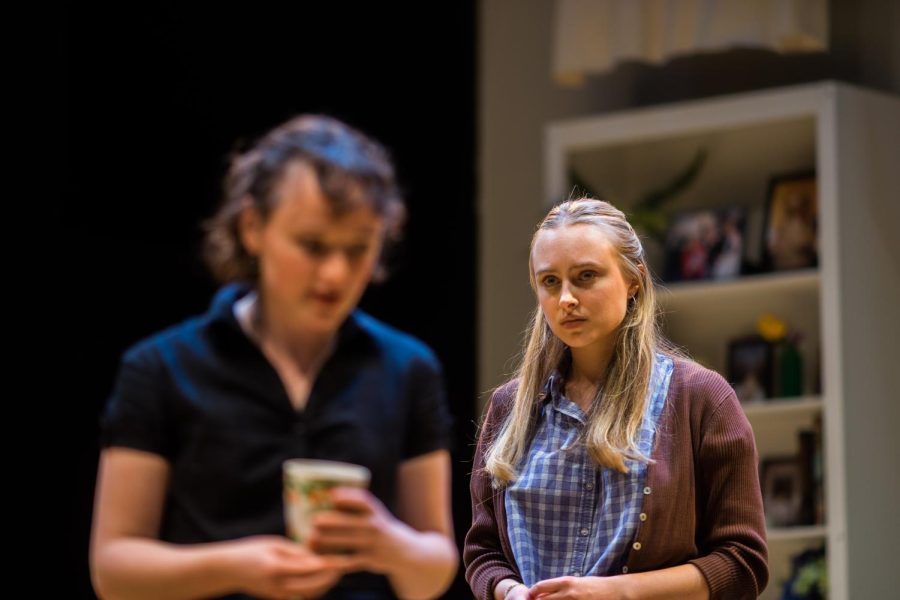Shayna Punim Grapples with Grief and Jewish Tradition
College fourth-year Clara Zucker’s play Shayna Punim opened last night.
The set of Shayna Punim, a play written and directed by College fourth-year Clara Zucker, features colorful books of all different sizes, a lint roller and vacuum, pillows tucked away beneath a coffee table, and a plethora of pictures of a beautiful woman sandwiched between family and friends. The play premiered at Kander Theater on Thursday and will run until Sunday, transforming the stage into a lived-in family room.
Shayna Punim, taken from a Yiddish phrase which translates to “pretty face,” follows the story of protagonist Ava and her family in the hour leading up to her grandmother’s shiva, a week-long mourning period in Judaism. The play deals with themes of grief and identity as Ava grapples with the loss of her beloved Nonnie and what it means for her own growth, relationship with her girlfriend, and identity as a lesbian.
Zucker partly based the play on her own grandmother. Paying homage to an important figure in her own life, she wanted audience members to grasp her grandm other’s wisdom.
“She passed away my first year of college,” explained Zucker. “I have grown so much since she died, so I was thinking a lot about that and how I could honor her in my last year of college.”
The play’s intimacy is apparent immediately. The interactions between the tight-knit, five-person cast seem so personal that it’s easy to forget that the people on stage aren’t really family members. This could perhaps be attributed in part to the history of the team, some of whom have been working together for four years.
College fourth-year Jane Hobson, who plays Ava, explained that she and Zucker have worked on a play together every year since their first year. As they both approach the end of their Oberlin Theater careers, this final production feels all the more important.
“I feel like most of my theater experience at Oberlin has kind of revolved around my working relationship with Clara,” Hobson said. “It’s fun to watch it all culminate around this final performance and this play that she wrote herself.”
Assistant director and College third-year Ella Fruchter has also spent much of her time at Oberlin working with Zucker, and expressed her own appreciation for the bonds that formed from their working relationship.
“I’ve had a very Clara Zucker-mediated relationship with theater, especially in the department,” said Fruchter. “I have a lot else going on, so getting to do a production with people I love — that’s awesome.”
However, Shayna Punim’s personal meaning makes it different from anything the cast has worked on before. This was an element that College fourth-year Kyra McConnell, who plays Ava’s girlfriend Hannah, found extremely influential to her when working with the material.
“There’s a newness and freshness to original student work that you won’t find in published works,” McConnell wrote in an email to the Review. “The dialogue and setting are ultra-contemporary, but the story and emotions conveyed are timeless. That balance is really exciting to work with as an actor because it creates a wide-open playing space.”
Fruchter also found it to be rewarding, though it was initially a bit intimidating to give notes on a piece that was so personal to the director. Still, after encouragement from Zucker and the cast, she began to feel more comfortable with what she was able to offer to the production.
“I think that my role is offering a fresh ear, a fresh eye, someone that’s not as emotionally involved with the subject matter,” Fruchter said. “But it’s still obviously important to respect Clara’s ownership over not only the experience but the play itself.”
Zucker was very open to feedback from her team. She even built it into the structure of the play’s production schedule.
“Once I started directing it, we spent the first week or so doing script development,” she said. “So basically I would have them read the script one scene at a time and then give me feedback on what was not working as an actor, or if there were plot holes in the story.”
This process of development made the play a much more collaborative effort, which did not go unnoticed by the cast. McConnell remembers finding the script development period particularly gratifying.
“I mean, the word play means play,” she wrote. “This is the most that I’ve gotten to play with a piece of theater before and that was really special. There was a kind of freedom of expression that was involved in the process that I’ve never experienced before.”
It is hard to miss the significance that Shayna Punim carries, not only in its themes but in the meaning that it holds for all those involved in its production. It is a play that deals with the difficulties of growing up, and will no doubt make audiences reflect on their own lives and the experience of loss. However, the show is far from melancholic; in fact, if it were to be assigned a genre, Fruchter believes it would be a comedy.
“I hope that the audience laughs,” she said. “Clara wrote a really funny play. To me, she is a comedian first and foremost, and I hope that they take this time to think about loss as well as life and how funny the process can be.”
Hobson jokes that the play is a lot like the 2020 Seligman film Shiva Baby.
“A lot of people really hated Shiva Baby, and it’s kind of similarly set during a shiva and is kind of crazy,” Hobson said. “But obviously I think Clara did a much better job with the shiva concept.”
For those who did not enjoy the Shiva Baby, though, Fruchter offers another analogy.
“Shayna Punim is like a bite-sized dessert,” she said. “It is all that drama and action and humor and beautiful, beautiful set design into an hour and given to you by an amazing team of students. It’s really all that you could ask for.”









